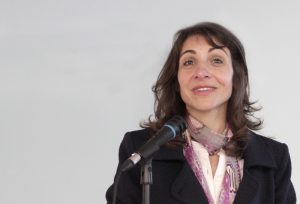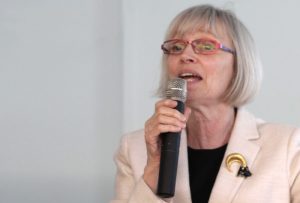Twin sisters Lorelei and Rosalind Silverman arrived in Canada from Romania 22 years ago in search of an opportunity to study. Since launching their careers as a neuroscientist and cell biologist, the sisters have been recipients of several awards for their professional achievements and their success settling in Canada.

Lorelei and Rosalind Silverman
Yet when Lorelei and Rosalind describe their first days in Canada, their story reveals the many barriers they had to overcome.
“Every single day was a small challenge when we first arrived, from opening a bank account to even getting official pieces of identification,” said the Lorelie during their keynote panel on June 5 at the Newcomers, Resilience and Settlement: Knowledge Exchange, organized by the Building Migrant Resilience in Cities (BMRC) partnership at York University. “Later, we realized that finding a job and making a life here would not be as easy as we thought.”
“We always had to have a plan B or C, and we knew that even if they cut us tomorrow, we would do something else. Like the Medusa from the Greek mythology – if one of our arms was cut, two more would grow,” said Rosalind.

Professor Jelena Zikic
This idea of immigrant resilience, and the ability to rebound from hardships and recover from distress, was the main topic of the BMRC partnership’s full-day conference that included presentations from academics, policymakers and practitioners in the settlement sector and welcomed more than 100 people.
“The Newcomers, Resilience and Settlement: Knowledge Exchange is a unique event in the sense that it brings together practitioners, as well as academics from Ontario and Quebec, and offers an opportunity for us to exchange knowledge on all ongoing projects,” said Professor Jelena Zikic, from York University’s School of Human Resource Management in the Faculty of Liberal Arts and Professional Studies (LA&PS).

Maziar Heidari, and Lorelei and Rosalind Silverman
The conference began with three panels where presenters discussed settling privately sponsored and government-assisted Syrian refugees; different local models for coordinating settlement services; and the challenges and opportunities of sanctuary cities. It ended with a conversation between Zikic, who recently received a Social Sciences and Humanities Research Council of Canada (SSHRC) grant for her individual resilience project, and Maziar Heidari, Lorelei and Rosalind, three past recipients of the RBC Top 25 Canadian Immigrant Awards.

Professor Valerie Preston
“This was a true knowledge exchange where provocative and timely presentations about settling newcomers, a pressing public issue around the world, fuelled lively discussions among presenters and audience members from Ontario and Quebec,” said Valerie Preston, principal investigator of the Building Migrant Resilience in Cities partnership, and a professor of Geography in LA&PS.
The BMRC partnership, a SSHRC-funded project, plans to organize similar conferences in the next year. To learn more about the project and for partnerships or inquiries about the Newcomers, Resilience and Settlement: Knowledge Exchange, contact Naolo Charles, at the Building Migration Resilience in Cities partnership at 416-736-2100 ext. 20544 or by email at naolo@yorku.ca.
